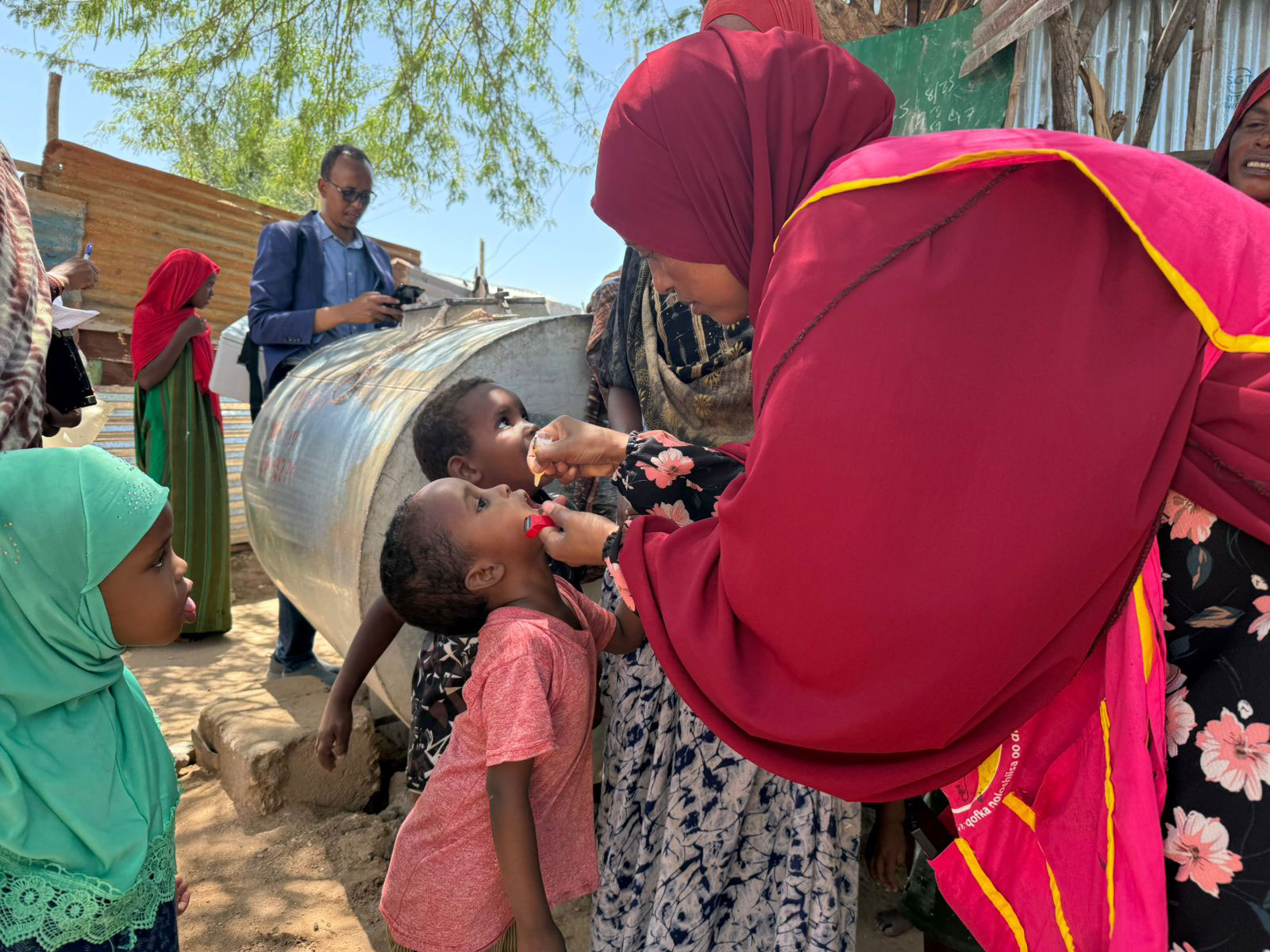 2 September 2025, Mogadishu, Somalia – More than 1.5 million children under 5 received the novel oral polio vaccine type 2 (nOPV2) in Somaliland and Puntland during the second round of a nationwide vaccination campaign.
2 September 2025, Mogadishu, Somalia – More than 1.5 million children under 5 received the novel oral polio vaccine type 2 (nOPV2) in Somaliland and Puntland during the second round of a nationwide vaccination campaign.
The campaign – part of Somalia’s ongoing efforts to end polio once and for all – launched on 24 August in Somaliland, where health teams successfully vaccinated 852,000 children – from urban and remote rural communities – with nOPV2. In Puntland, the campaign began on 26 August and protected 676,000 children across all districts, including in hard-to-reach areas where access to health care is limited.
In both states, the campaign was led by the respective ministries of health, in collaboration with the World Health Organization (WHO), the United Nations Children’s Fund (UNICEF), and Global Polio Eradication Initiative (GPEI) partners. Ahead of the vaccination drive, frontline health workers were trained to administer the vaccine safely, maintain accurate records, and follow strict safety protocols, ensuring that every child reached was fully protected.
“We have not yet reached where we need to be, but we remain committed to eradicating polio,” said Dr Ahmed Jama, Director General of the Ministry of Health Development, Somaliland. “Vaccination is helping safeguard our children and prevent deadly outbreaks. The communities of Somaliland, especially parents, have worked hand in hand with us. Delivering vaccines to our children is vital. It strengthens public health, which in turn builds healthier, more educated and resilient communities. We will continue our awareness efforts to ensure that lifesaving messages reach every corner of Somaliland.”
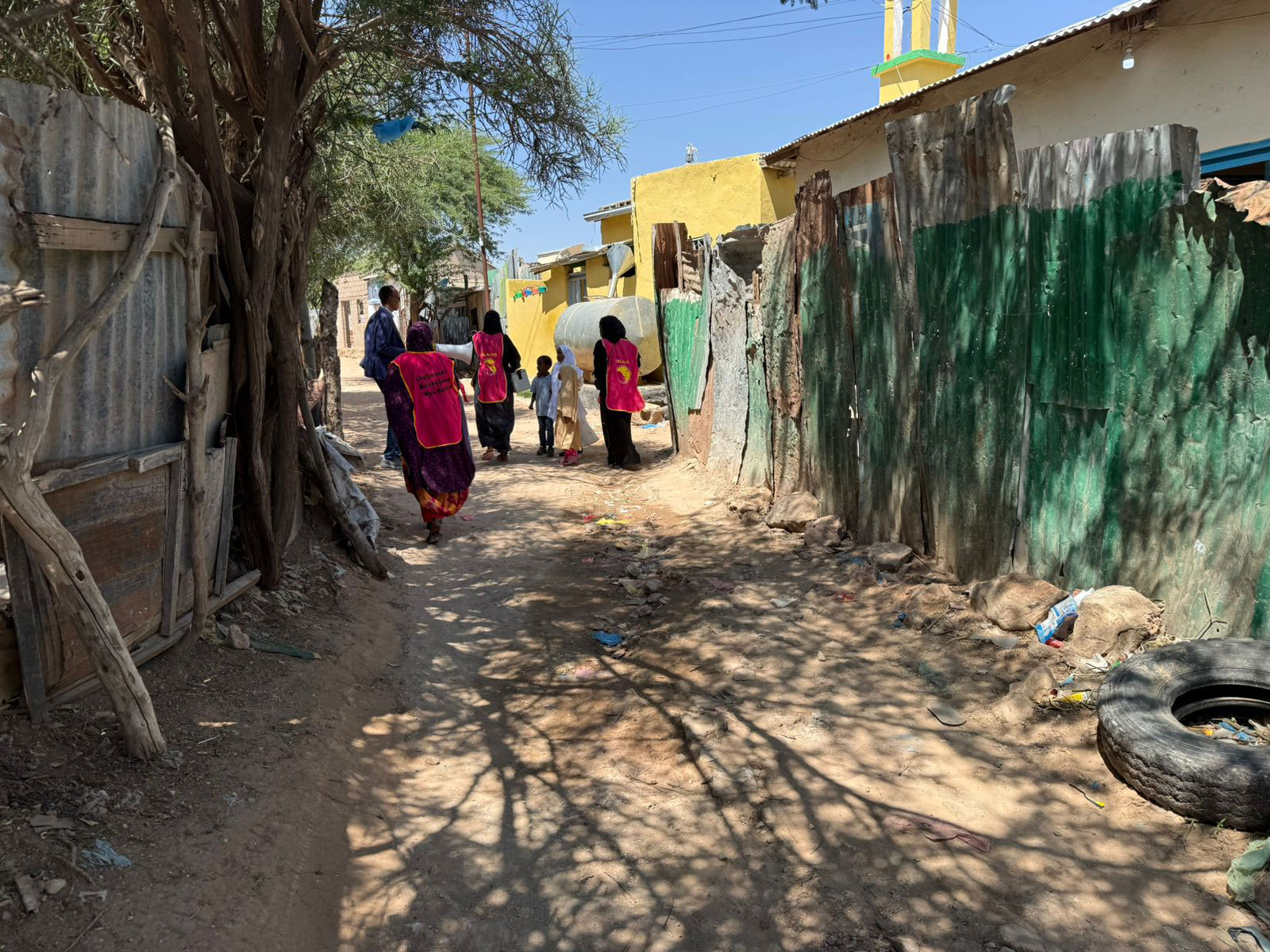 In addition to administering polio vaccines, the campaign strengthened routine immunization services and engaged communities to build trust, address concerns and raise awareness about the importance of immunization.
In addition to administering polio vaccines, the campaign strengthened routine immunization services and engaged communities to build trust, address concerns and raise awareness about the importance of immunization.
Similar polio campaigns, with ministries of health working closely with WHO and UNICEF, have been conducted in other Somalia’s states. So far in 2025, 3 rounds have been completed in southern and central states – a sub-national immunization round and 2 national immunization rounds – targeting around 2.7 million children under 5. These rounds have helped strengthen protection against polio while maintaining high levels of community awareness and trust.
Somalia’s progress in immunization extends beyond polio. In May 2025, Somalia successfully introduced the pneumococcal conjugate vaccine (PCV) and the rotavirus vaccine into its national immunization schedule. Together, these protect children against pneumonia and severe diarrhoea, 2 leading causes of death among Somali children under 5.
For more information, please contact:
Khadar Hared, Communication Officer, WHO Somalia
Tel: +252619800011
Email: Cette adresse email est protégée contre les robots des spammeurs, vous devez activer Javascript pour la voir.





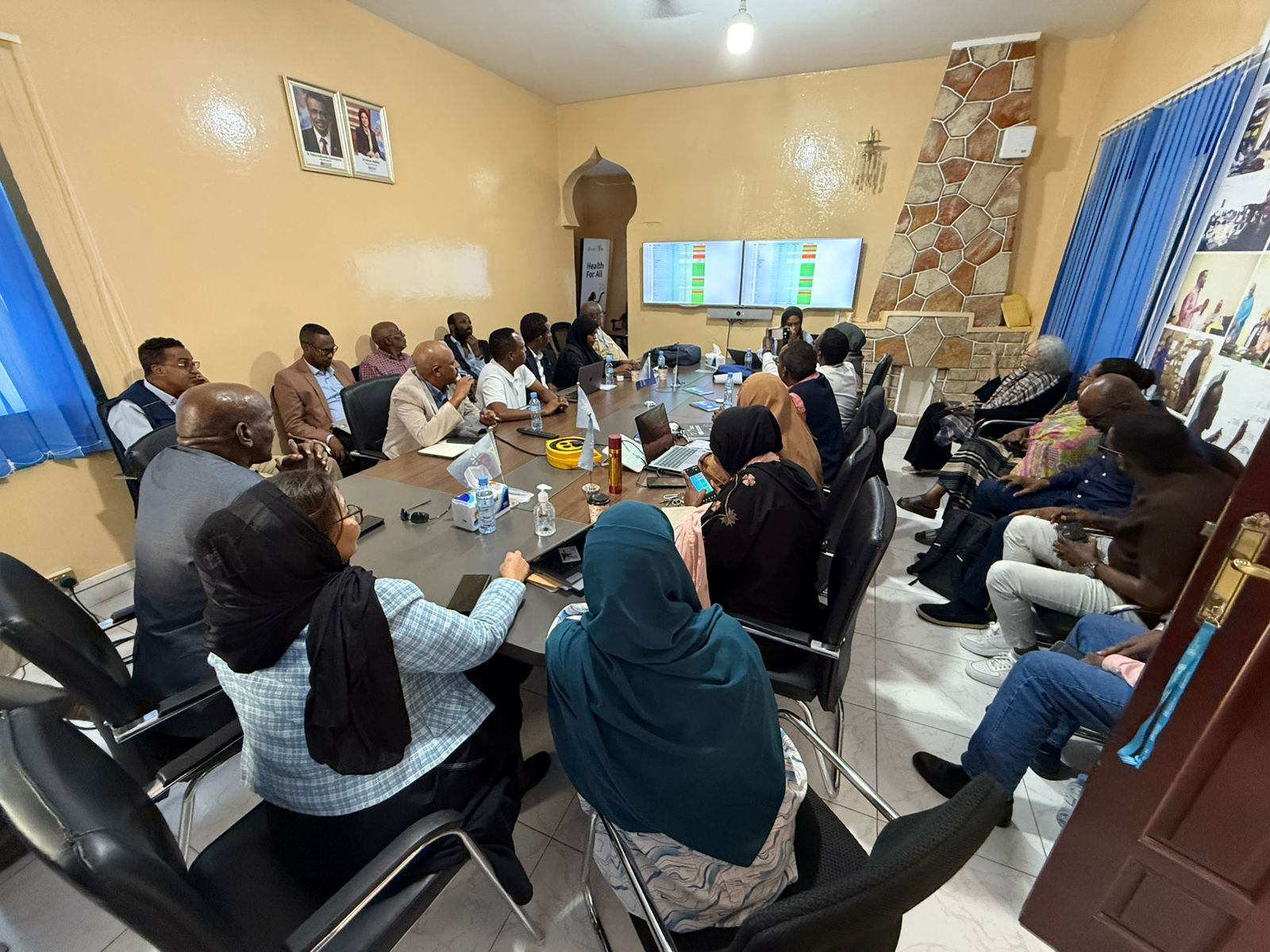 25 August 2025, Mogadishu, Somalia – World Health Organization (WHO) Somalia recently, 20-21 August 2025, completed a lively 2-day professional development training on results-based management (RBM), with a focus on the theory of change (ToC). The sessions aimed to equip technical staff with new skills and tools to plan, monitor, and report on health programmes.
25 August 2025, Mogadishu, Somalia – World Health Organization (WHO) Somalia recently, 20-21 August 2025, completed a lively 2-day professional development training on results-based management (RBM), with a focus on the theory of change (ToC). The sessions aimed to equip technical staff with new skills and tools to plan, monitor, and report on health programmes.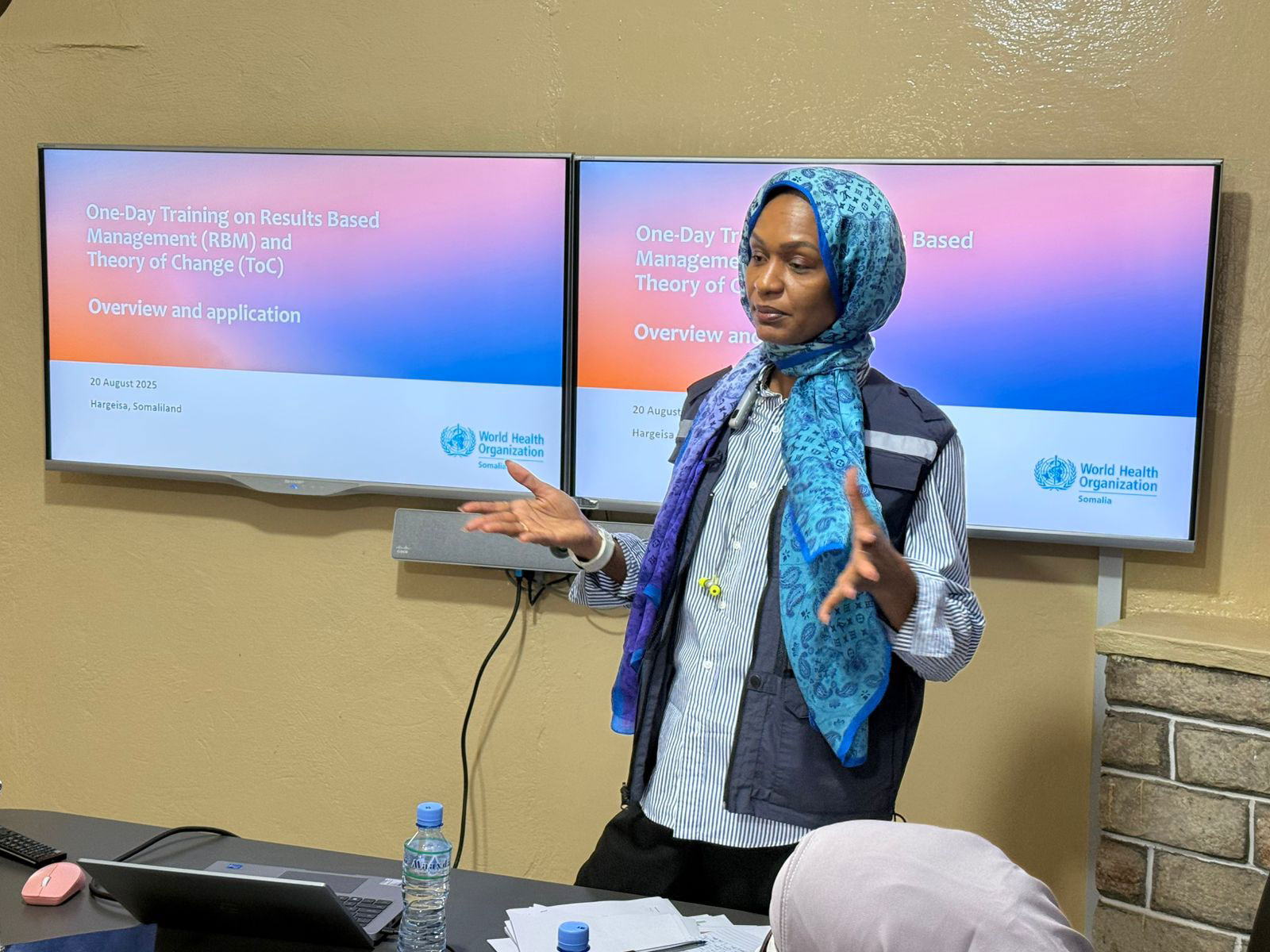 “The training is important because it helps our teams connect their daily work to long-term results,” said Programme Management Specialist at WHO Somalia Nazik Elshiekh. “By using the theory of change, we can better articulate how our interventions lead to improved health outcomes, while also enhancing accountability to the people we serve.”
“The training is important because it helps our teams connect their daily work to long-term results,” said Programme Management Specialist at WHO Somalia Nazik Elshiekh. “By using the theory of change, we can better articulate how our interventions lead to improved health outcomes, while also enhancing accountability to the people we serve.”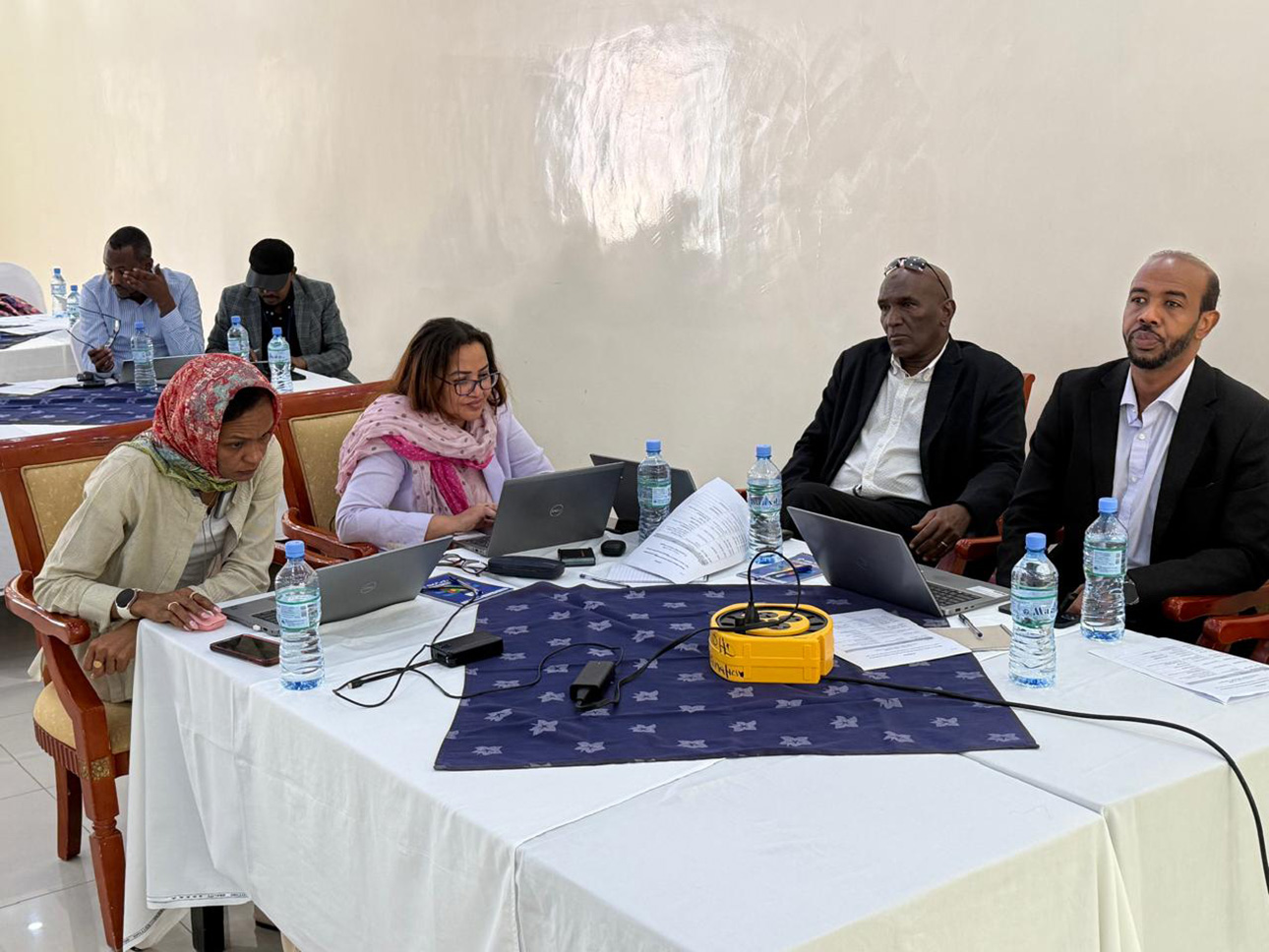 21 August 2025, Mogadishu, Somalia – The World Health Organization (WHO) is working alongside the Somaliland Ministry of Health Development (MoHD) and partners to improve public health services and strategic planning. A key component of the drive is the development of an operational plan for health priorities to guide health development in Somaliland.
21 August 2025, Mogadishu, Somalia – The World Health Organization (WHO) is working alongside the Somaliland Ministry of Health Development (MoHD) and partners to improve public health services and strategic planning. A key component of the drive is the development of an operational plan for health priorities to guide health development in Somaliland.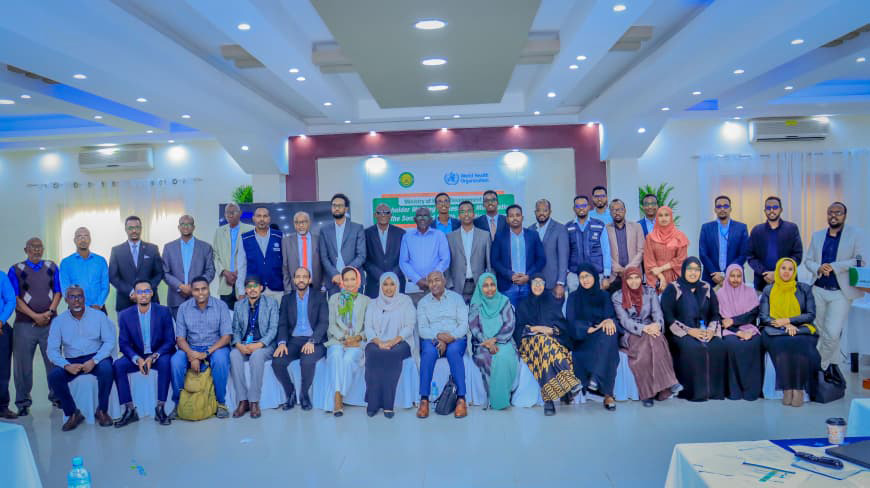 The operational plan will serve as a blueprint for strengthening health systems, shaping future health projects and improving the delivery of essential services. It will set out clear monitoring and implementation mechanisms, helping MoHD and partners track progress, respond to emerging challenges and remain accountable to the government and the communities being served.
The operational plan will serve as a blueprint for strengthening health systems, shaping future health projects and improving the delivery of essential services. It will set out clear monitoring and implementation mechanisms, helping MoHD and partners track progress, respond to emerging challenges and remain accountable to the government and the communities being served.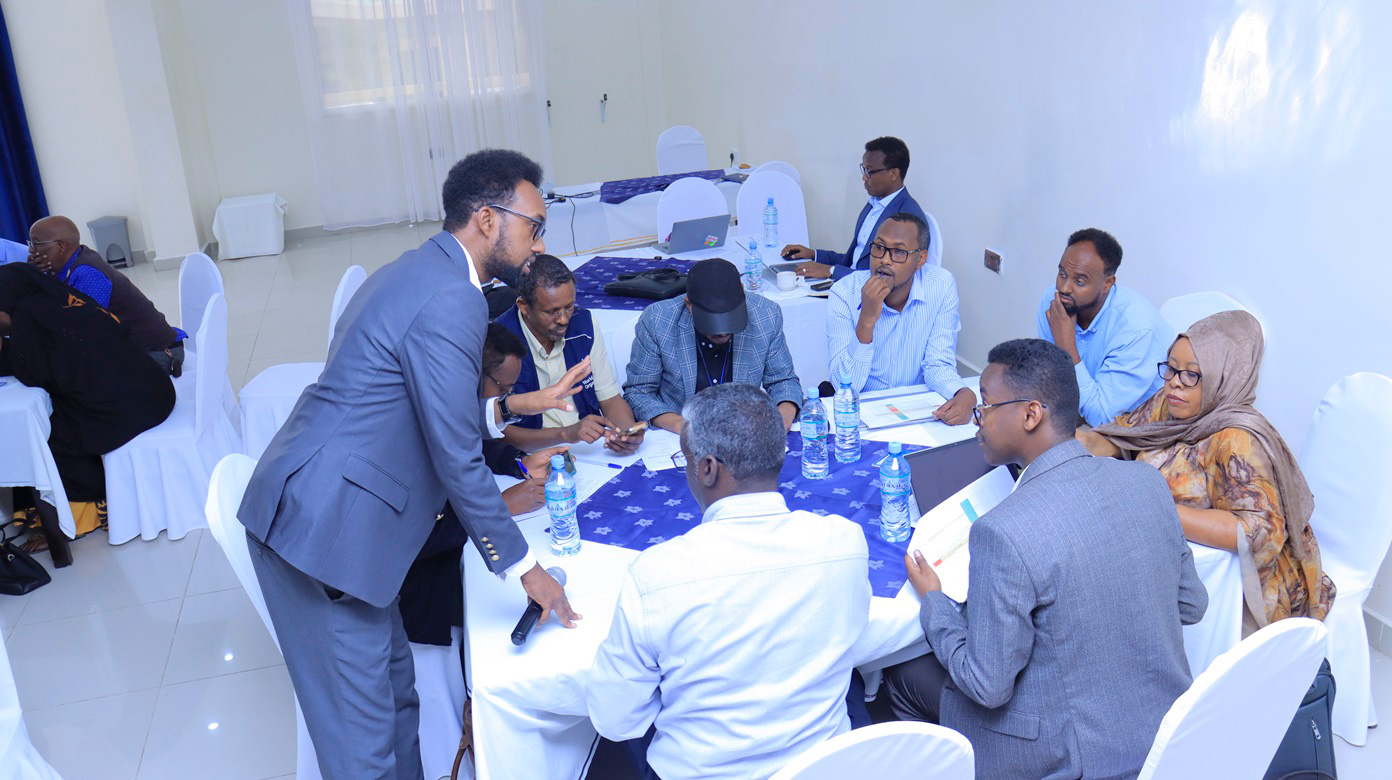 During the 2-day meeting in Hargeisa, WHO and MoHD laid out new health priorities to tackle the most significant gaps in Somaliland’s health system. By coming together, these efforts will lead to:
During the 2-day meeting in Hargeisa, WHO and MoHD laid out new health priorities to tackle the most significant gaps in Somaliland’s health system. By coming together, these efforts will lead to: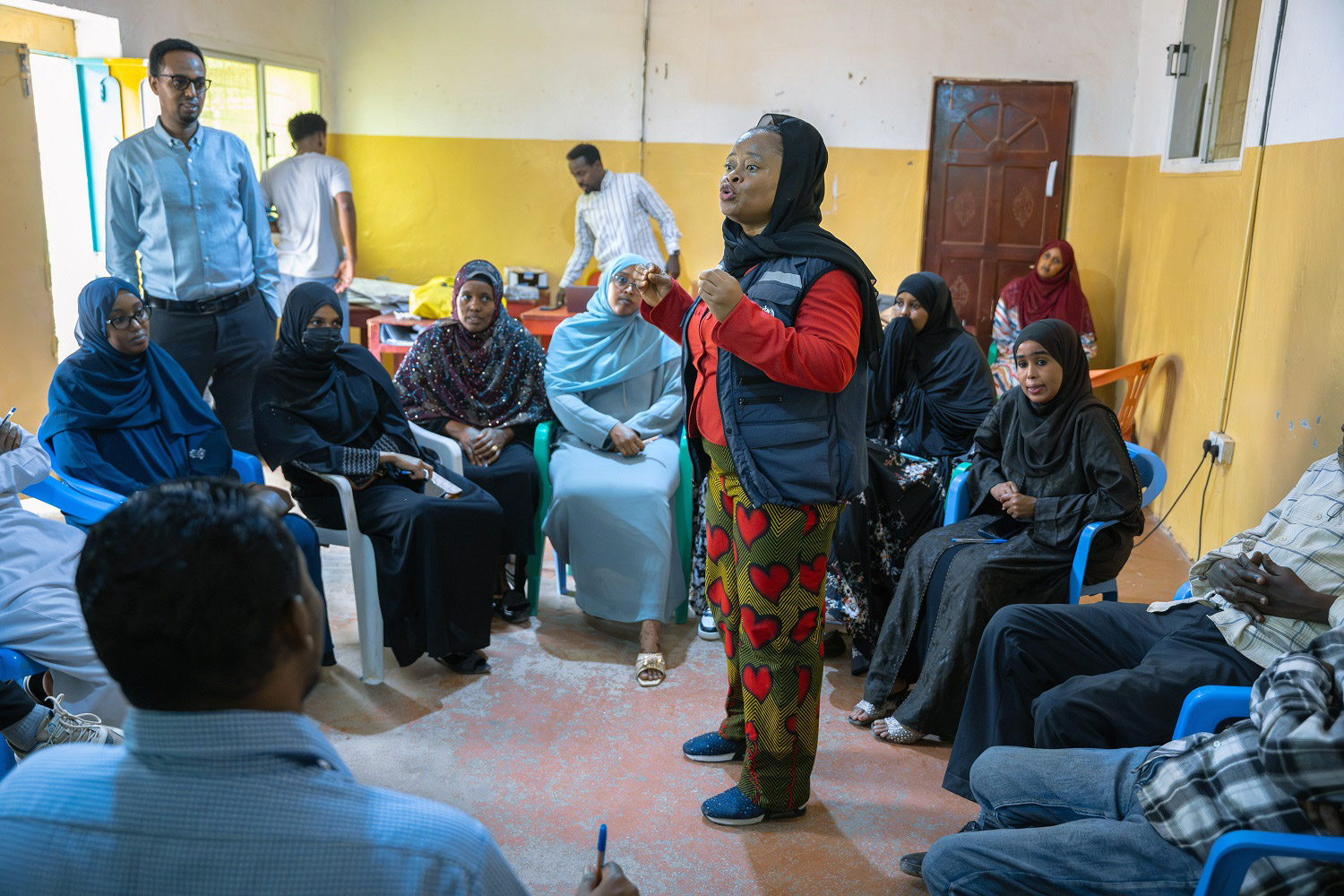 19 August 2025, Mogadishu, Somalia – In Somalia’s under-resourced hospitals, trauma patients often arrive to find blood supply and essential medical equipment shortages, trauma teams with limited capacity and inadequate systems in place for handling a surge in trauma patients. During mass casualty incidents these limitations cause delays that put lives at risk.
19 August 2025, Mogadishu, Somalia – In Somalia’s under-resourced hospitals, trauma patients often arrive to find blood supply and essential medical equipment shortages, trauma teams with limited capacity and inadequate systems in place for handling a surge in trauma patients. During mass casualty incidents these limitations cause delays that put lives at risk.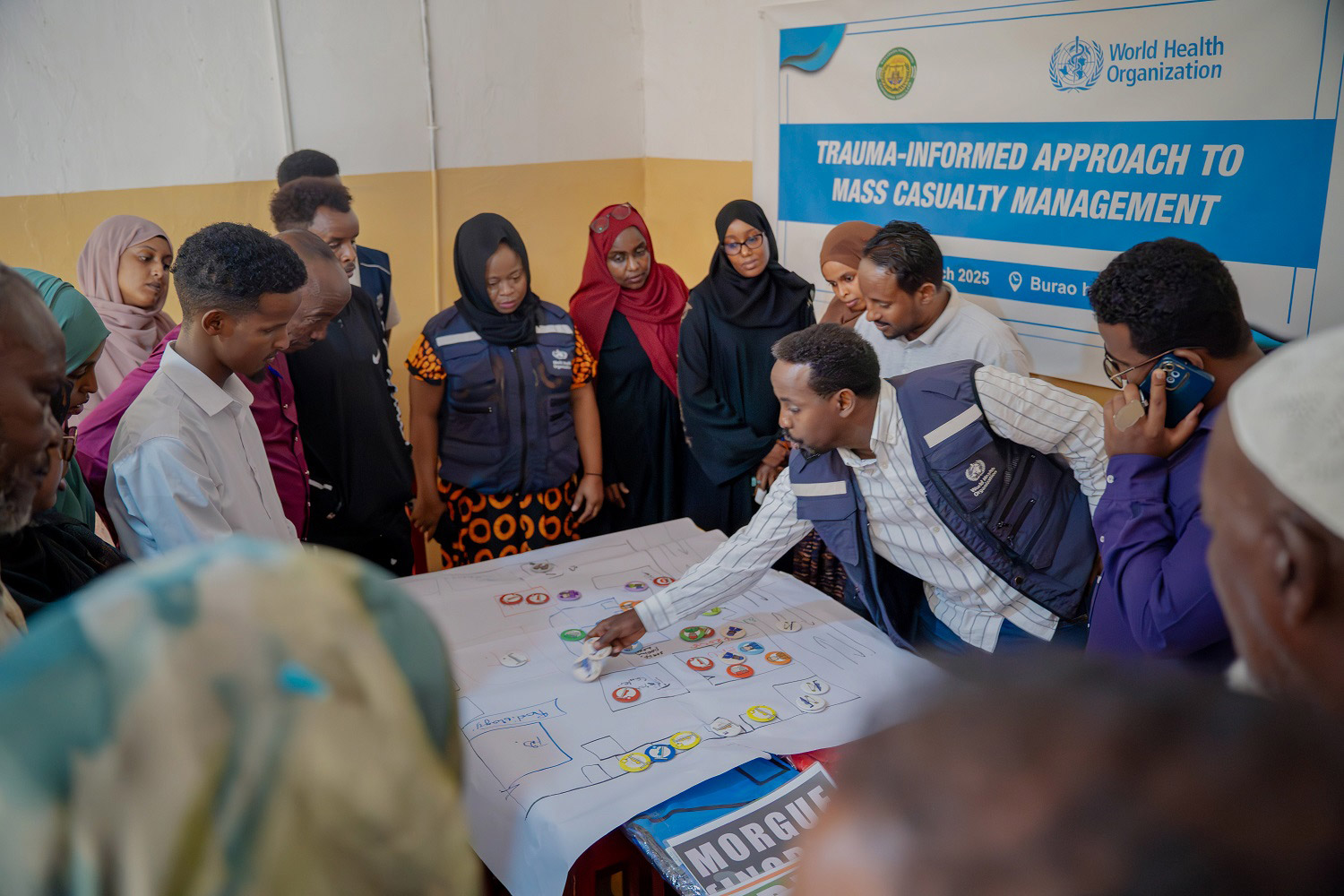 The training in Bossaso and Burao brought together 49 frontline staff, including doctors, nurses and support workers, to prepare for high-stress emergencies. Participants practiced triage under pressure and conducted full simulation drills to replicate the chaos of conflict-driven surges. Unlike most emergency trainings in Somalia, the programme guided frontline staff through self-care planning, stress regulation techniques and clinically supervised debriefings to help safeguard their mental health.
The training in Bossaso and Burao brought together 49 frontline staff, including doctors, nurses and support workers, to prepare for high-stress emergencies. Participants practiced triage under pressure and conducted full simulation drills to replicate the chaos of conflict-driven surges. Unlike most emergency trainings in Somalia, the programme guided frontline staff through self-care planning, stress regulation techniques and clinically supervised debriefings to help safeguard their mental health.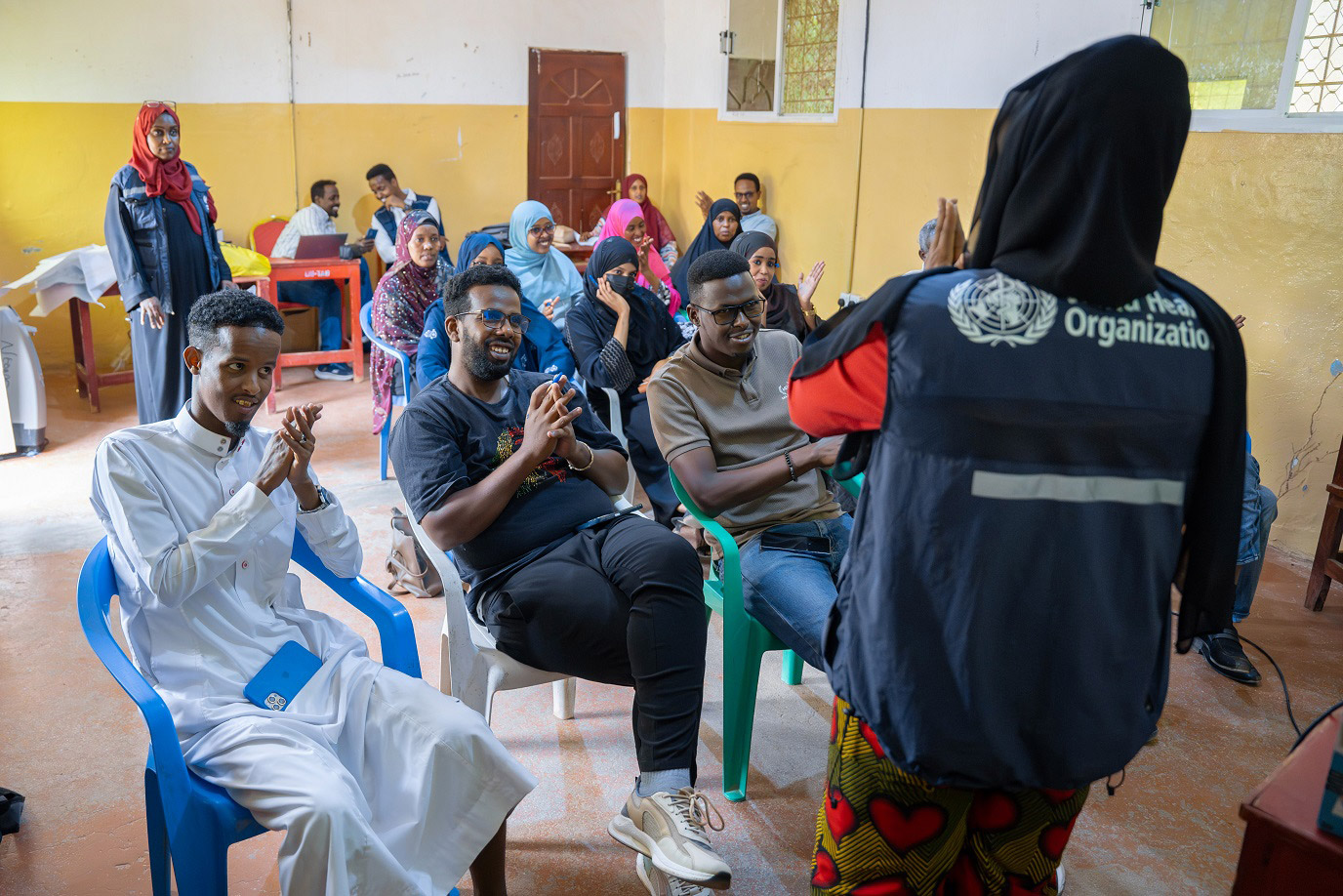 In parallel with the training, WHO distributed 32 trauma kits to hospitals across Federal Member States. Many of these facilities are in hard-to-reach or conflict-affected areas, including Jubaland, Hirshabelle, Galmudug, Puntland, Southwest State and Banadir. To speed up emergency response, the kits were pre-positioned at WHO hubs in Hargeisa, Garowe and Mogadishu.
In parallel with the training, WHO distributed 32 trauma kits to hospitals across Federal Member States. Many of these facilities are in hard-to-reach or conflict-affected areas, including Jubaland, Hirshabelle, Galmudug, Puntland, Southwest State and Banadir. To speed up emergency response, the kits were pre-positioned at WHO hubs in Hargeisa, Garowe and Mogadishu.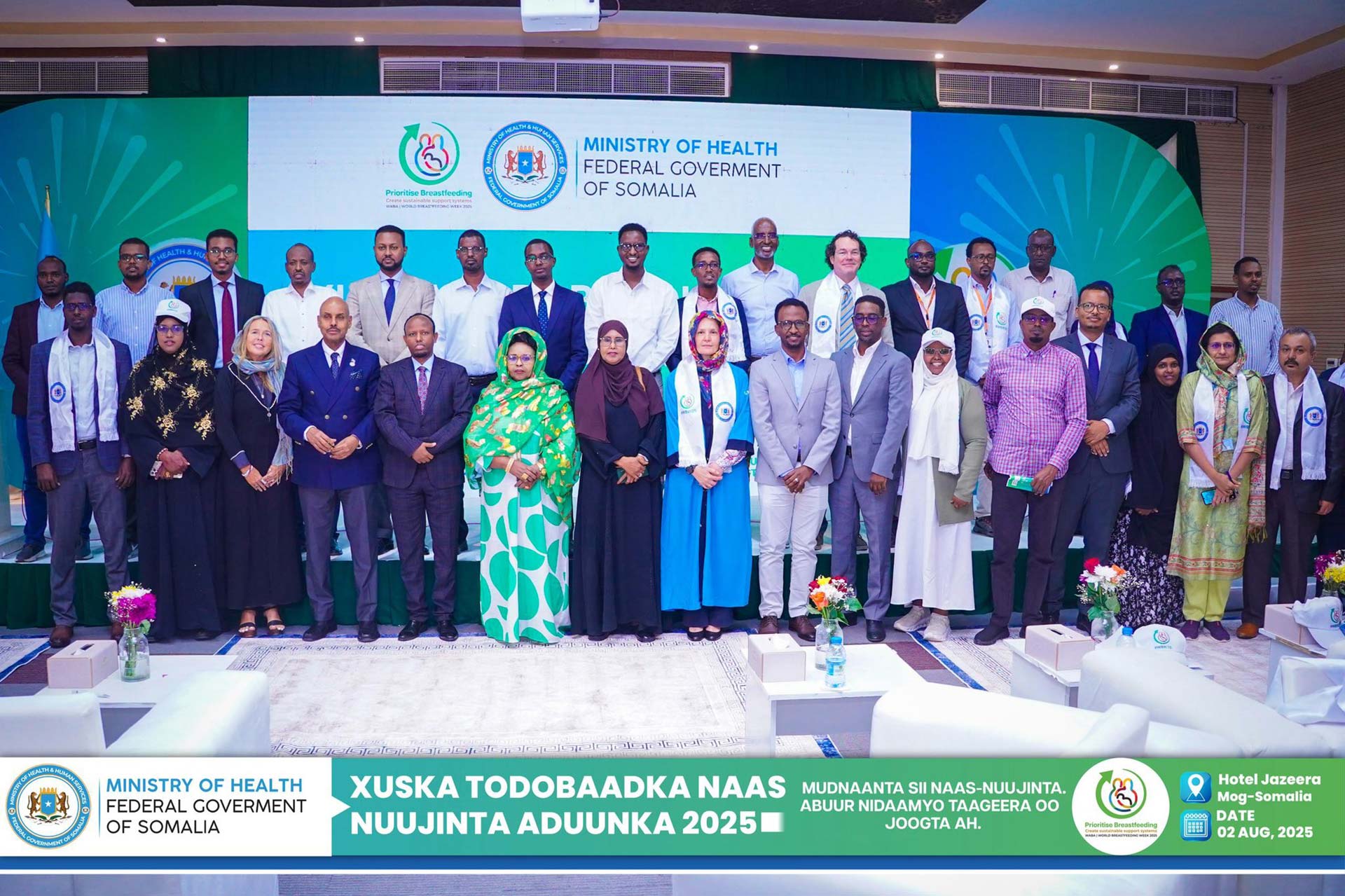 This year’s theme, Prioritize Breastfeeding: Create Sustainable Support Systems, recognizes the barriers that breastfeeding mothers face – inadequate support, misinformation and systemic challenges that include a lack of paid time off from work to breastfeed, of parental leave after the baby is born, and inadequate protection from marketing of breastmilk substitutes – and calls on the government, the health system, workplaces and communities to build enduring, equitable frameworks that support breastfeeding mothers and empower families.
This year’s theme, Prioritize Breastfeeding: Create Sustainable Support Systems, recognizes the barriers that breastfeeding mothers face – inadequate support, misinformation and systemic challenges that include a lack of paid time off from work to breastfeed, of parental leave after the baby is born, and inadequate protection from marketing of breastmilk substitutes – and calls on the government, the health system, workplaces and communities to build enduring, equitable frameworks that support breastfeeding mothers and empower families.